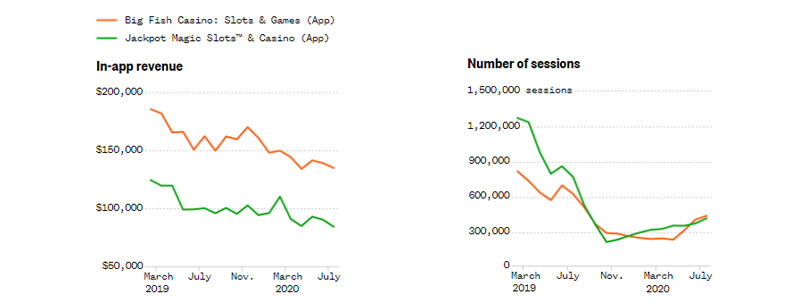‘Helpless and Wanting to Quit’ Players class suit will cost a social game developer $155m! So what are the dangers of social games? How could the American company from Seattle producing “free-to-play” (F2P) games drain players $139.3m dollars? Read about all this in my review of social casino games, often played as an alternative to real money online casinos.

All the material below is based on benchmarking analysis I’ve recently made. There is nothing more dangerous for the gambling addicted like a real money casino! But there is… casino-like applications like Jackpot Magic or Big Fish that have pumped $139.3m out of their users within six months. So why do the developers of apps akin to online casino still remain unregulated? For those who think they got the deserved punishment, just look at the app monthly revenue in a 6-month period.

Social Games in a Nutshell
What exactly is a social game? These are video games allowing social interaction. As compared to casino games played for real money, there isn’t a chance to get anything of value.
They become very popular with social network users. Based on Statista.com, as of October 2020, the most popular games have 10 million active players on Facebook. And that didn’t bother me till recently I’ve discovered that the apps actually endanger people. The consequences of being hooked on casino-style gaming are the same as in real money casino, maybe, even worse, as you’re unaware of the dangers. So, the players can:
- end up losing large sums;
- find himself becoming addicted to the entertainment;
- have no idea of the winning odds (as no outside testing is made);
- be tempted by the company’s aggressive marketing strategies. Accounting that some of us prone to “dopamine rush” that comes from gambling – it can lead to serious harm too.
I won’t deny. There’re some benefits too, like:
- pleasure from playing;
- the low barrier to entry;
- unique social functions: to invite friends, chat with club members, coordinate real-time tournaments;
- and it’s free. Few players actually buy virtual items, but this was more than enough in Big Fish case.
How ”Not Gambling” Apps Pump Millions Out of Players
There’s a couple of common fallacies about gambling. One being that people can hit a bottom only if they play at real money online casinos. Gambling addicts can plow thousand dollars using social game mobile application.
Labeled as free and purely for entertainment, some of the applications are built to keep you spending REAL MONEY in different ways: (a) in-app purchases aka for enhancing your gameplay experience; (b) a fee for high roller club membership as an alternative to actually collecting points; (c) and free chips for those who try to quit or close the account. If people decide to splurge thousands of dollars during the play, that’s up to them. Nobody forced them to make in-app purchases.
Now the question is, “What made the judge approve the $155M settlement that related to Churchill Downs and Aristocrat in 2018?” Let’s listen to the people losing real money in social casino-like apps arguments as what companies think we already know.
The company, of course, sees nothing wrong here. However, in a light of ongoing legal battle, Big Fish answered some of the questions raised by NBC News on May, 2020.
These games are not gambling because, among other reasons, they offer no opportunity for players to win money or anything of value…
To Hell and Back: Gamblers Stories
21 of 2 million players spoke about their experience. I won’t be going into detail much, if you want to know more, check the original article on NBC News. If you don’t want to click on the link, I’ve summarized everything below. Here’re 6 victims of the social gambling appeared to be mentioned there.
- Crystal Fair, a woman from Texas, who spent $500K at Big Fish Casino.
- Suzie Kelly of Dallas, she spent $400K there.
- Shellz, a 37-year-old Houston nurse alone with his husband spent around $150K in Jackpot Magic game in 2 years.
- Joann, a 46-year old woman from Florida, spent $100K at Big Fish Casino in 8 years.
- Neva Barker, a 58-year old retiree from Oregon – $80K.
- A 42-year-old addiction counselor from Pennsylvania spent $40K.
And two million social casino players who lost $10K-$100K including Cheryl Kater, Suzie Kelly and Manasa Thimmegowda were provided 20% restitution by the companies.

Interestingly, in 2014, Churchill Downs company bought Big Fish Games for $885 million, then, in 2018, sold it to Aristocrat Leisure for nearly one billion dollars. It doesn’t sound like a ‘good deal’. They had to pay 31 million dollars of the settlement along with Churchill Downs (124 million dollars).
The Federal Court of Appeal held that the companies had violated Washington state law against placing real money wagers online by offering the game chips that actually had “something of value.” Even with the tightly regulated gambling markets as the USA, such things like this are very hard to crack, thus to regulate.
Social vs Real-Money Gambling
| Criteria | Social | Real Money |
|---|---|---|
| Income Generation | In-built purchases | Player losses |
| Mobile Video Poker | Unregulated | Regulated |
| Advertising | 18+ only | 18+ only |
| Payout | Nothing of value | 90-95% Return |
| Responsible Gambling | Not compulsory | Compulsory |
The Bottom Line
The boundaries between social gaming and commercial gambling have become increasingly blurred. No other type of free games let users lose so much money that fast. Dare to say that even real online casinos business practices aren’t that predatory. At least, you can get a percentage of your money back. And the slots, table or card games are independently checked for fairness.




Big Fish Games statement: